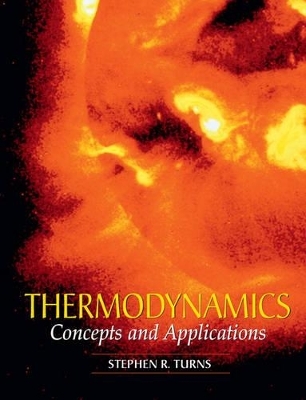
Thermodynamics
Cambridge University Press
978-0-521-85042-1 (ISBN)
- Titel erscheint in neuer Auflage
- Artikel merken
The focus of Thermodynamics: Concepts and Applications is on traditional thermodynamics topics, but structurally the book introduces the thermal-fluid sciences. Chapter 2 includes essentially all material related to thermodynamic properties clearly showing the hierarchy of thermodynamic state relationships. Element conservation is considered in Chapter 3 as a way of expressing conservation of mass. Constant-pressure and volume combustion are considered in Chapter 5 - Energy Conservation. Chemical and phase equilibria are treated as a consequence of the 2nd law in Chapter 6. 2nd law topics are introduced hierarchically in one chapter, important structure for a beginner. The book is designed for the instructor to select topics and combine them with material from other chapters seamlessly. Pedagogical devices include: learning objectives, chapter overviews and summaries, historical perspectives, and numerous examples, questions and problems and lavish illustrations. Students are encouraged to use the National Institute of Science and Technology (NIST) online properties database.
Stephen R. Turns has been a Professor of Mechanical Engineering at The Pennsylvania State University since completing his PhD at the University of Wisconsin in 1979. Before completing his PhD Steve spent five years in the Engine Research Department of General Motors Research Laboratories in Warren, Michigan. His active research interests include the study of pollutant formation and control in combustion systems, combustion engines, combustion instrumentation, slurry fuel combustion, energy conversion, and energy policy. He has published numerous refereed journal articles on many of these topics. Steve Turns is a member of the ASME and many other professional organizations and an ASME-ABET Program Evaluator since 1994. Steve is also a dedicated teacher for which he has won numerous awards including the Penn State Teaching and Learning Consortium, Hall of Fame Faculty Award; Penn State's Milton S. Eisenhower Award for Distinguished Teaching; the Premier Teaching Award, Penn State Engineering Society; and the Outstanding Teaching Award, Penn State Engineering Society. Steve's talent as a teacher is also reflected in his best-selling advanced undergraduate textbook Introduction to Combustion: Concepts and Applications 2/e. Steve's commitment to students and teaching is reflected in the innovative approach and design of Thermal-Fluid Sciences: An Integrated Approach and its companion volume Thermodynamics, also published by Cambridge University Press.
Preface; 1. Beginnings; 2. Thermodynamic properties, property relationships and processes; 3. Conservation of mass; 4. Energy and energy transfer; 5. Conservation of energy; 6. Second law of thermodynamics and some of its consequences; 7. Steady-flow devices; 8. Systems for power production, propulsion, heating and cooling; Appendix A. Historical timeline; Appendix B. Thermodynamic properties of ideal gases and carbon; Appendix C. Thermodynamic and thermo-physical properties of air; Appendix D. Thermodynamic properties of H20; Appendix E. Various thermodynamic data; Appendix F. Thermo-physical properties of selected gases at 1ATM; Appendix G. Thermo-physical properties of selected liquids; Appendix H. Thermo-physical properties of hydrocarbon fuels; Appendix I. Thermo-physical properties of selected solids; Appendix J. Radiation properties of selected materials and substances; Appendix K. Mach number relationships for compressible flow; Appendix L. Psychometric charts; Answers to selected problems; Index.
| Erscheint lt. Verlag | 6.3.2006 |
|---|---|
| Zusatzinfo | Worked examples or Exercises; 41 Tables, unspecified; 321 Plates, color; 690 Line drawings, unspecified |
| Verlagsort | Cambridge |
| Sprache | englisch |
| Maße | 222 x 286 mm |
| Gewicht | 1690 g |
| Themenwelt | Naturwissenschaften ► Physik / Astronomie ► Thermodynamik |
| Technik ► Maschinenbau | |
| ISBN-10 | 0-521-85042-8 / 0521850428 |
| ISBN-13 | 978-0-521-85042-1 / 9780521850421 |
| Zustand | Neuware |
| Haben Sie eine Frage zum Produkt? |
